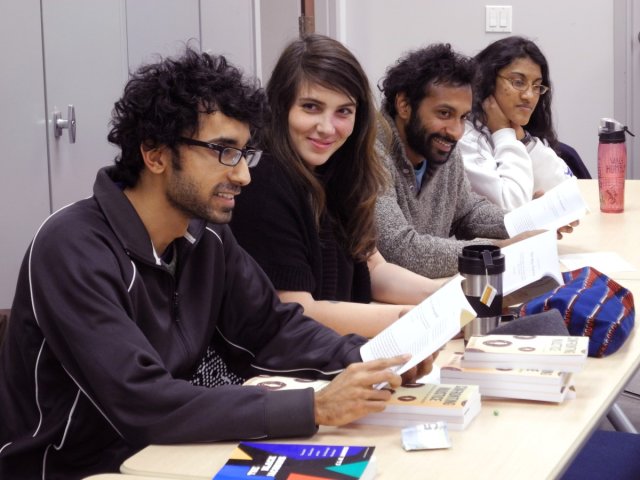
Confronting Injustice: Social Activism in the Age of Individualism
Umair Muhammad
www.confrontinginjustice.com
Too many supposedly radical books are written by academics for academics, apparently competing to see who can produce the most incomprehensible prose.
My list of “books to be reviewed” contains literally dozens of overstuffed and overpriced volumes that only a handful of specialists will ever read, and with little relevance to the non-university world.
So it is a true delight to read a book written by an activist for activists, a practical contribution to building real struggles for a better world.
Confronting Injustice is a powerful call for collective action against the social causes of poverty and climate change.
Umair Muhammad is a student at York University, but lives and is politically active among low-income and immigrant workers as a member of Jane Finch Action Against Poverty. He is also active in the campaign to block plans to pump tar sands crude through Toronto.
His book addresses young people like himself, men and women in their teens and 20s. He argues that environmental destruction and poverty, the two biggest crises facing humanity, have common roots. These are the economic system that allows corporations and the wealthy to over-exploit the world’s resources, while billions go hungry.
He writes: “There can be no such thing as a democratic, socially just, and environmentally sustainable capitalism … it unavoidably produces a world full of injustice and inequality in order to secure a global division of labour suitable to profit-making; and it unavoidably produces the kind of ecological destruction which makes its own longevity, and that of human civilization, impossible.”
Muhammad argues firmly for socialism, which, following Canadian Marxist Michael Lebowitz, he defines as a “solidarian society” motivated by human needs, not profit.
He writes: “Socialism would entail an end to the existence of a distinct area of life regarded as the economic sphere. The democratic management of economic life would mean that the economy would become subordinate to the wider relationships that make up society. Non-economic motives would direct economic activity, as they have throughout most of human history.”
Two of the book’s four chapters address “Inequality and Activism” and “Climate Change and Activism”. Each concisely outlines the problems, the role of capitalism in creating and perpetuating them, and the inadequacies of the most commonly promoted solutions — charity and “NGOism” for poverty, market solutions for climate change.
The book’s most important chapter is the first, “The Age of Individualism”. Muhammad argues that a major barrier to the development of effective movements against poverty and environmental destruction is capitalism’s successful implantation of pro-capitalist ideology in the minds of the people who should be its strongest opponents.
Contrary to claims frequently made by journalists, young people today are not indifferent to social problems. Indeed, “activist ideals and vocabulary have securely made their way into everyday life”.
But those ideals are distorted by “the cultural values that have arisen out of capitalism” and as a result “are used to reinforce the social realities they were originally devised to change”.
“Living within a social system dominated by the market, it is no coincidence that so many of us have adopted an individualist outlook,” he writes.
“The routine of market exchange between individuals who are driven by self-interest has conditioned us to see human society as a collection of disconnected and primarily self-interested individuals.”
This could have been a dry and abstract discussion, but it reads like a friendly discussion among activists. For example, Muhammad stresses the dangers of a focus on individual lifestyle change, while recognising that such an approach often rests on honourable motives.
He writes: “On its own, there are many good things to be said about cutting back on what we consume and living in a way that is not grounded in petty materialistic values. Living a clutter-free life is a wonderful thing, but it is not in itself the same thing as working to create social change…
“There is a qualitative difference between, on the one hand, embracing the individualism that defines lifestyle-centric activism and, on the other, coming to recognize the social dimensions of the problems we face.”
Muhammad wisely refrains from offering detailed guidelines on how to build a movement for revolutionary change.
He writes: “The exact sequence of events, and the events themselves, through which the needed change comes about will no doubt differ from place to place.
“The conditions which exist in any given country will require a strategy specific to them. The pace, too, will vary from location to location.”
What he provides in his final chapter is a general approach to social change, based on sources as varied as Martin Luther King, George Orwell, Michael Lebowitz, Bertrand Russell, Mahatma Gandhi and David Graeber.
Muhammad’s views are influenced by various schools of radical thought, and it’s not clear to me that the result is consistent or coherent. Be that as it may, what he provides is an opening statement in an important discussion that activists must have.
It’s especially important that it be read and debated by a new generation that, like its predecessors, is searching for its own path to radical conclusions.
[Abridged from Climate and Capitalism. Ian Angus is editor of Climate and Capitalism and author of How To Make an Eco-Socialist Revolution, published by Resistance Books.]
Like the article? Subscribe to Green Left now! You can also like us on Facebook and follow us on Twitter.